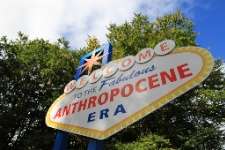
I read an interesting [article](http://opinionator.blogs.nytimes.com/2013/11/10/learning-how-to-die-in-the-anthropocene/?emc=eta1&_r=1&) in today’s NYTimes about life in the Anthropocene, our emerging geologic era. The I found the headline, “Learning How to Die in the Anthropocene;” compelling. In the previous era, the Holocene, the forces of nature dominated the planetary system. There were many fluctuations during this, perhaps 100,000 year-long, period of our Planet’s history, but nature’s forces were in control and relatively well behaved. The steadiness of this era promoted an explosion in species evolution, including that of our own species, Homo sapiens.
But now human activities are competing with nature for control. We have begun to see many more extreme events that wreak increasingly costly damages to human life and human settlements. Just this week we got news of a devastating typhoon passing through the Philippines, destroying whole villages with a large estimate of fatalities, perhaps as many as 1-20,000. Serious storms have always been with us, but now they seem to leave much larger scars on the surface of the Earth. One can find much written on this subject, including work by some who are skeptical that such a change is occurring, but that is not why I chose it for today’s blog.
This paragraph caught my eye.
> The challenge the Anthropocene poses is a challenge not just to national security, to food and energy markets, or to our “way of life” — though these challenges are all real, profound, and inescapable. *The greatest challenge the Anthropocene poses may be to our sense of what it means to be human.* Within 100 years — within three to five generations — we will face average temperatures 7 degrees Fahrenheit higher than today, rising seas at least three to 10 feet higher, and worldwide shifts in crop belts, growing seasons and population centers. Within a thousand years, unless we stop emitting greenhouse gases wholesale right now, humans will be living in a climate the Earth hasn’t seen since the Pliocene, three million years ago, when oceans were 75 feet higher than they are today. We face the imminent collapse of the agricultural, shipping and energy networks upon which the global economy depends, a large-scale die-off in the biosphere that’s already well on its way, and our own possible extinction. If homo sapiens (or some genetically modified variant) survives the next millenniums, it will be survival in a world unrecognizably different from the one we have inhabited. (emphasis added)
I believe we have already forgotten what is means to be human, which amnesia accounts for the mess we have created on the planet’s surface, notwithstanding what we have done to the climate. Our cultural proclivities have led to an unsustainable mode of life, where, in the rush to acquire wealth and possessions, we have despoiled our resources and diminished our Being, that is, what it is to be [explicitly] human. While some live in luxury, many more are joining the ranks a new lost class, where compared to the rest of us, life is “solitary, poor, nasty, brutish, and short.” Mostly we live in much better conditions than the poor of Hobbes’s time, but relatively speaking many alive today resemble the masses he describes.
The centerpiece of my work on flourishing is this loss of our fundamental humanness and its impact on modern societies. I believe we can recover what being human really means, but only at the cost of abandoning parts of the mechanical culture we call modernity: not everything about it; it has mitigated the conditions that Hobbes postulated. But we are heading toward a point where we cannot predict what nature will do as we continue to insult her. You should read the entire article I refer to above. I am heartened to see articles like this appear in print in the public media, not in the scholarly journals where they are seen only by a very few specialists. I hope those who take time to find and read it will do so with a very careful eye. The warnings here are to be taken very seriously.